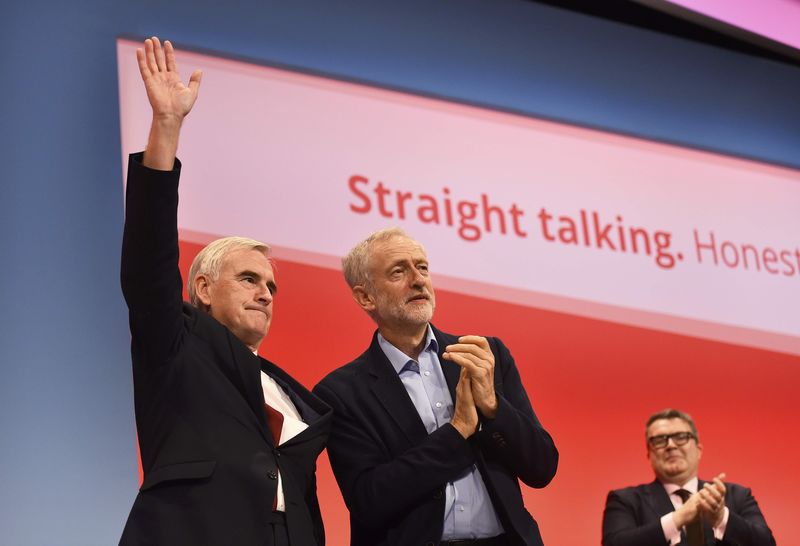By William James and Kylie MacLellan
BRIGHTON, England (Reuters) - Britain's opposition Labour Party said on Monday if it won the next election it would force large corporations such as Starbucks (NASDAQ:SBUX), Vodafone (LONDON:VOD), Amazon (NASDAQ:AMZN) and Google (NASDAQ:GOOGL) to pay their "fair share" of taxes to help end austerity policies.
In a speech aimed at silencing critics who say Labour has moved too far to the left under its new leadership, finance spokesman John McDonnell largely struck a more moderate tone than previously on central bank independence and taxing financial transactions.
But the former trade unionist took aim at corporations, a move some business leaders said could reduce investment and do little to persuade companies that Labour under veteran lawmaker Jeremy Corbyn wanted to work with business.
McDonnell acknowledged that the party must prove it can run the economy if it wants to win the next parliamentary election due in 2020 after suffering a crushing election defeat by the Conservative Party earlier this year.
He said Labour would aim to balance the budget, but its focus would be on strong growth and investment. He would spare middle or low earners from spending cuts, instead reducing the "corporate welfare system" of tax incentives.
"We need to prove to the British people we can run the economy better than the rich elite that runs it now," he told his party's four-day annual conference in the southern city of Brighton.
"Labour's plan to balance the books will be aggressive. We will force people like Starbucks, Vodafone, Amazon and Google and all the others to pay their fair share of taxes," he said to loud applause.
His comments would mean taking on some of the biggest global corporations and could worry business leaders who see Corbyn's left-leaning policies as a threat to the health of the economy.
John Cridland, director-general of the Confederation of British Industry, a leading British employers' group, said in a statement McDonnell's speech suggested more state intervention.
"Most companies pay the right amount of tax and in the last financial year business paid 174 billion pounds," he said. "Singling out individual companies ... is not the best way of signalling a partnership approach with business."
Vodafone, the world's second-biggest mobile operator, said the comment about its tax payments was "disappointing" and its investment in Britain far outweighed profits from the country.
"MARX IN FASHION"
Some Labour members of parliament fear that the party is unelectable under Corbyn, and while many have kept silent on the subject, others are hoping that the new leader will become unstuck as he struggles to overcome deep divisions in his own party.
One Labour lawmaker who has been critical of Corbyn, John Mann, was relieved that McDonnell did not deliver any firm policies, raising hope that others might influence his ideas.
"He basically hasn't put any of the meat in the sandwich," he told Reuters. "I'm very relieved he hasn't. It gives us the opportunity for the rest of us, and for industry, to say what the meat should be."
After earlier telling a radio station that Karl Marx, co-author of "The Communist Manifesto", was back in fashion, McDonnell used his speech to strike a more moderate position.
Corbyn, chosen as party leader two weeks ago over better-known rivals on a wave of enthusiasm for change, also sought to portray himself as more moderate on Sunday.
But for a man who lists the overthrow of capitalism among his interests in the Who's Who directory of influential people, McDonnell offered a relatively tame speech, apparently aimed at easing concerns over his stance on the central bank and taxes.
He also did not mention by name Corbyn's idea of "people's quantitative easing", printing money in an economic downturn to invest in infrastructure projects.
Some economists have supported the idea, saying it could help boost public investment, while others, including the central bank governor Mark Carney, have warned about changes to policy that could spur inflation.
"Let me be clear that we will guarantee the independence of the Bank of England," McDonnell said, aiming to calm fears after he had called for the government to reclaim the power to set interest rates.
He said Labour would consider expanding its inflation-targeting mandate to include economic growth, employment and earnings, in what would be the first such change in 18 years at the BoE.
If elected, Labour would also launch a consultation on introducing the so-called Tobin tax, a tax on financial transactions, but would only act if there was consensus on the idea, he said.
McDonnell said he would concentrate on the general goal of spurring growth to end austerity policies which he said were punishing the most vulnerable and the poorest in Britain.

"Austerity is not an economic necessity," he said, taking aim at the Conservatives who he accused of representing only the top one percent of Britain's population. "It's a political choice." ($1 = 0.6587 pounds)